Latinos in the United States: "A few people destroy our reputation": how the debate about the Trump Wall affects Hispanics
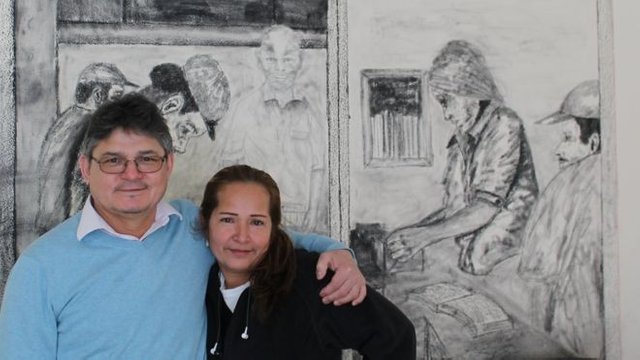
Central American migrants have occupied the news center in the United States during the last months. They are mentioned by Donald Trump as one of the main reasons for building a wall on the southern border of the United States. And the recent caravans that seek to reach US soil have stoked an anti-immigrant discourse, which has palpable consequences for those Latinos who already live in the country. Vicky Baker, a BBC News reporter, visits a Latino community in the state of Maryland to tell how all this debate is affecting Hispanics in the United States.
The Catrachito looks like a classic American restaurant: chrome accessories and a counter, stools and divisions between one table and the other.
However, instead of hamburgers and smoothies, the menu offers traditional Central American foods: baleadas (stuffed tortillas), slices (fried plantains), pupusas (spongy corn tortillas).
A Honduran flag covers the back wall, while all clients speak in Spanish.
The restaurant is located in Wheaton, a small town in the county of Montgomery (Maryland, USA), with a particularly abundant Latin American population. The last census, in 2010, calculated that the Hispanic community here was 42%.
Maybe you're interested too
A Salvadoran, the daughter of a Haitian and four Africans who triumphed in the United States arrived from countries despised by Trump
"They are tougher than anyone you've ever met": the expansion of the Mara Salvatrucha in the United States that worries Donald Trump
Americans who fervently support Trump's "zero tolerance" policy with immigrants
"Children are terrified": the controversy in the USA for the government's decision to separate undocumented immigrants from their children
End of recommendations
Currency of exchange
"This place is eclectic," says Omar Lazo, who runs the Salvadoran restaurant Los Chorros, which celebrates its 30th anniversary this year. "They're all family businesses, almost (no) chain."
Like many people in the area, Lazo feels that Latinos are being used as a bargaining chip by politicians, while they have very little representation in the upper echelons of politics
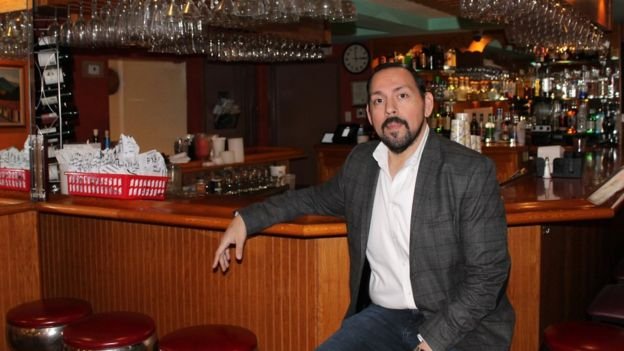
He says that the latest news (many of which relate President Donald Trump's speech about the "crisis" of migrants and the "dangerous" caravans) are difficult to see.
Omar's parents arrived in the United States from El Salvador in the 1970s and opened the restaurant a few years later. He was born in the USA.
"All you hear is that it's an invasion," he says. "But it's about my family, my community, it's dehumanizing."
However, he assures that he has not felt any personal backlash that could be linked to Trump's speech.
"People do not despise us in this place," explains Lazo, who also serves on the board of the local Chamber of Commerce.
"They see our people working in construction in the middle of the freezing weather, they know they can trust their cleaning employees with the keys to their house."
Future in danger
Wheaton is a dormitory city. The Washington DC metro runs all the way here, and Baltimore is just to the east.
With the construction of new apartment blocks and the expected new metro line under construction in the vicinity, there are indications that the rise of a wealthy class in this area may be just around the corner.
At present, few businesses of very simple appearance extend along wide roads. In the middle of them is the Wheaton Welcome Center, a building recently painted in yellow and blue, that offers support to immigrant workers.
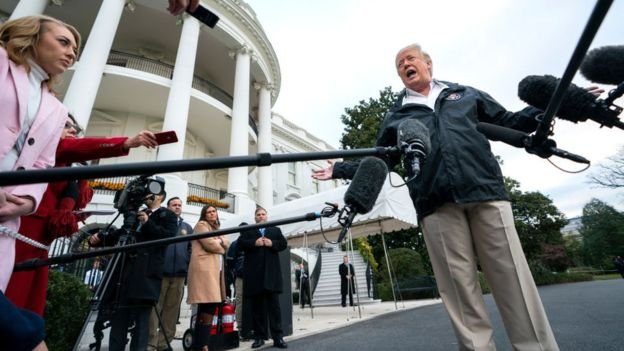
Every day at 6 in the morning, a crowd of workers gathers in the reception room. Local employers, mostly homeowners, know that here they will find staff for short-term jobs.
The center is part of the Casa de Maryland, a support organization that emerged under the name of the Central American Solidarity Association of Maryland, in the 1980s.
"It is open to all, not only to Latinos," says one of its directors, Lindolfo Carballo, while pointing to an artist from Malawi, author of one of the murals at the Center.
Many of the people who talk inside are Salvadorans, the largest immigrant group in the area.
Some arrived as economic migrants in the 1970s. Then, a larger wave arrived in the US. escaping the civil war, and in 2001 more Salvadorans emigrated after the devastating earthquakes that hit their country.
It was the natural disasters that led to the granting of Temporary Protected Status (TPS), which gives them the right to work and protects them from being deported.
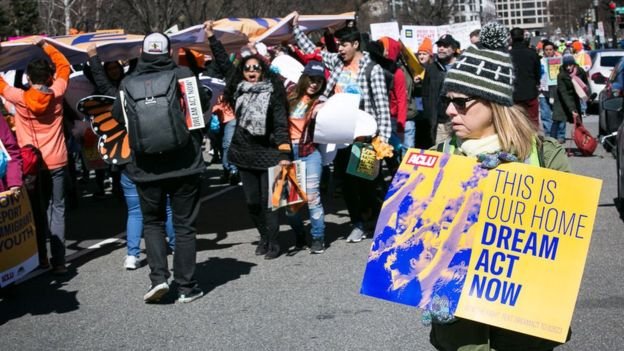
Today, some Salvadoran-Americans in this area are second or even third generation citizens.
Others, however, depend on TPS (which must be renewed every two years) or DACA, a program implemented during the Barack Obama administration to protect undocumented youth who arrived in the United States. in childhood.
These people feel that their future is in danger, after the Trump administration took measures to rescind both schemes.
Repercussions
Currently, both TPS and DACA continue to function, largely due to judicial fights initiated by Casa and other advocacy organizations of Latino migrants in the United States.
"None of this (debate) is really new," says Carballo, who arrived in the country from El Salvador in the 1990s.
"The wall is not new, there is already a huge wall on the border, and Trump did not build it, the deportations are not new either, they used to call Obama the 'chief deporter'".
What has changed is the tone, says Carballo, who has personally felt the repercussions. A couple of diners told him to "go home" while eating at an Italian restaurant recently.
These people approached him to ask about the caravan of Central American migrants, which Trump has made a central point in his speeches.
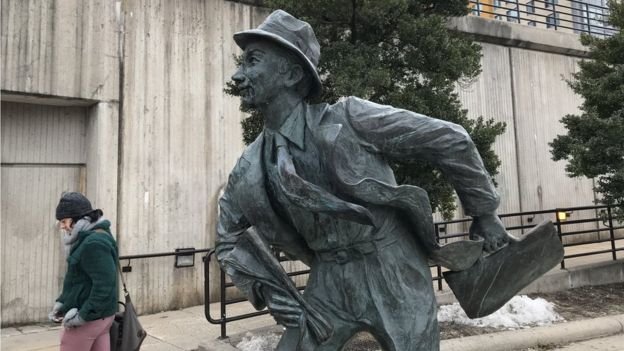
Carballo refuses to use the word "caravan." "It makes it sound weird, when in reality it's an exodus."
At the local level, Casa de Maryland says it has support and that the county council helped them acquire funds for the new Welcome Center, which opened in November.
However, there have been some complaints from critics who believe that day work centers encourage undocumented workers. In 2007, one of these centers was the target of an arson attack.
Carballo insists that if people did not use their premises to find workers, this practice would continue to happen, but in an unregulated manner, which would leave immigrants subject to exploitation.
By coming here, they receive help when filing their taxes and have legal assistance if they do not receive their payment. The verification of the documents, however, depends on the employers.
Country "fucking"
Daisy Sánchez, a regular at the center, was a nurse in El Salvador before coming to the United States in 2000.
She tries not to let the news depress her. "I'm educated, from a good Christian family, I'm not a thief, this country needs us here," he says.
Sanchez has taken all the training courses offered by the center (plumbing, construction) and now paints houses for a living. He remains optimistic.
"Life is beautiful, it's like a novel: every day is different."
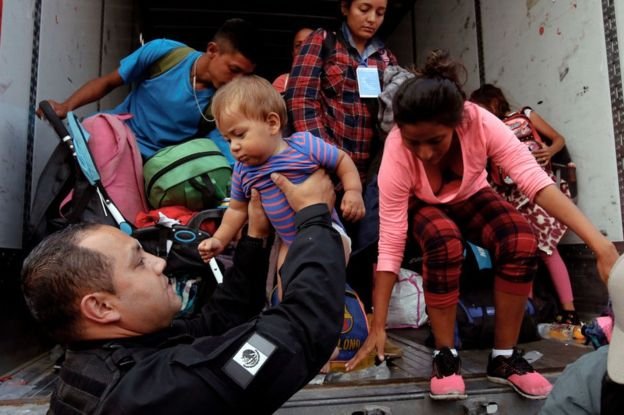
On this particular day they did not give him work, but tomorrow at 6am he will be back.
Javier Solis, originally from Ecuador, runs the accounting firm Los Taxes, with his Salvadoran wife, María.
"They should allow undocumented people, who pay millions in taxes, to be able to be part of the system, those who do not even have a parking ticket," he says. "We should be working together, Democrats and Republicans."
He mentions Nancy Navarro, the county's first Latina councilor, as a model of positive local behavior, and also mentions the Republican governor of Maryland, Larry Hogan, who is "active with the Latino community" and has distanced himself from the president's rhetoric. Trump.
Omar Lazo says he was not even surprised when President Trump said El Salvador was a "shit country." "No one knows anything about El Salvador," he says. "They only think about gangs."
The president has regularly resorted to naming the MS-13 gang when he warns about the risks of migration from Central America.
He recently repeated this rhetoric, speaking after Congress denied him the US $ 5,700 million required to build the border wall with Mexico.
This gang, which started in the United States but has its roots in El Salvador, is present in Wheaton.
He was attributed a brutal murder in a city park in 2017, but local police say that this type of crime is rare.
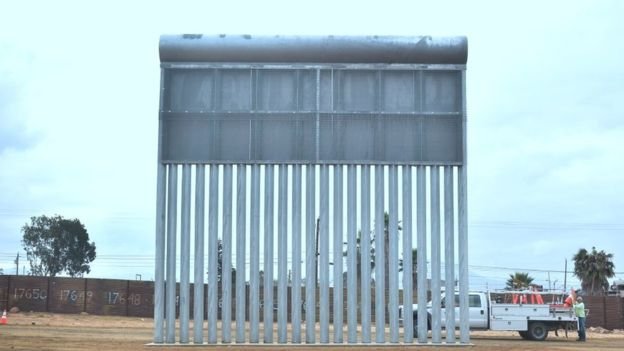
In 2018, there were no gang-related homicides in the county, according to Capt. Roland Smith, director of the special investigations division of the Montgomery County police.
"Gangs often take advantage of people who respect the law in the Latino community, especially the vulnerable, and victims are often afraid of enforcing the law, so that is our greatest challenge," Smith tells the BBC.
"We are appealing to the community and doing a lot of work with them so that people trust us."
Salvadoran residents in Wheaton say that the last thing they want is for violence to pursue them.
"A few people destroy our reputation," says Javier Solís.
"People come from El Salvador to escape gangs, we want them to catch them, we should be working to find them."